Surfing in southeast Scotland is about as far from the barrelling waves of Hawaii or sun-kissed California as you can get; nonetheless, there’s an ever-growing community of committed (and often cold) surfers between Dunbar and Eyemouth
Journalist David Lyons and photographer Mike Guest walked the 42km Duneye one route over two days, heading southeast from Dunbar to Eyemouth, passing through the three main surfing beaches on this coast; Belhaven Bay, Pease Bay and Coldingham Bay where, they write, “The weather is cold, the water is colder and the waves are fickle”. The walk connects the two surf shops in the area: Coast to Coast Surf School at Belhaven Bay and St Vedas Surf Shop at Coldingham Bay.
Together, Dave’s interviews and Mike’s photography resulted in the Slow Waves zine. The stories in the beautifully designed zine are all connected to the beaches they walked on their route and present a snapshot of a thriving surf community and its history.
The zine is available to pre-order now. Below is a preview of some of the stories and photography you might find
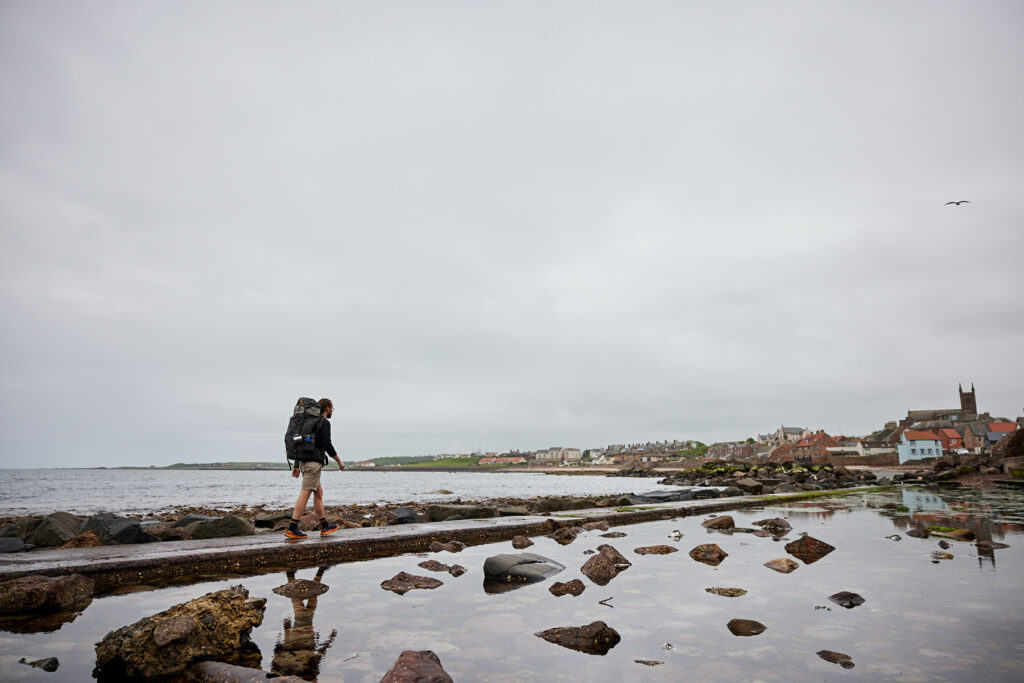
The walk began at Coast to Coast Surf School on Belhaven Bay, an expansive beach at the west end of Dunbar. Sam Christopherson founded Coast to Coast and led the development of the Belhaven community surf centre. The centre was originally designed as a surf school, but has evolved to be home to a range of different organisations: the surf therapy charity Wave Project’s Scottish headquarters, Dunbar Surf Lifesaving Club, Belhaven Surf Club, Wilder Outdoor Education and Kosa Yoga.
In the future we’ll have lots of local kids that grew up to have good knowledge of the sea and are looking after their environment
Sam hopes the surf centre can serve as a focal point for establishing a positive, sustainable relationship between the local community and the beach: “With all these things happening from one space, they cross fertilise ideas; so in the future we’ll have lots of local kids that grew up to have good knowledge of the sea and are looking after their environment.”
“There’s a lot of people that have come with a lot of knowledge that are all feeding the same kind of culture, so hopefully when I finally retire and hang my boots up, there’s a good community left to look after and manage what is a beautiful coastline.”
Wave Project Scotland supports vulnerable young people through surf therapy and is run by Alison Young, who said the community that has grown around the charity in Belhaven is what has enabled it to thrive: “It’s about making connections, with the ocean, with the other young people and with the volunteers. It’s such a supportive space. I mean, the kids are going to fall off – everyone falls off – but when you do it here you get a big cheer and a high five and we get them back on to try again. I can’t think of a nicer place to be – a beautiful beach and a fabulous group of people trying to make the world a little bit better.”
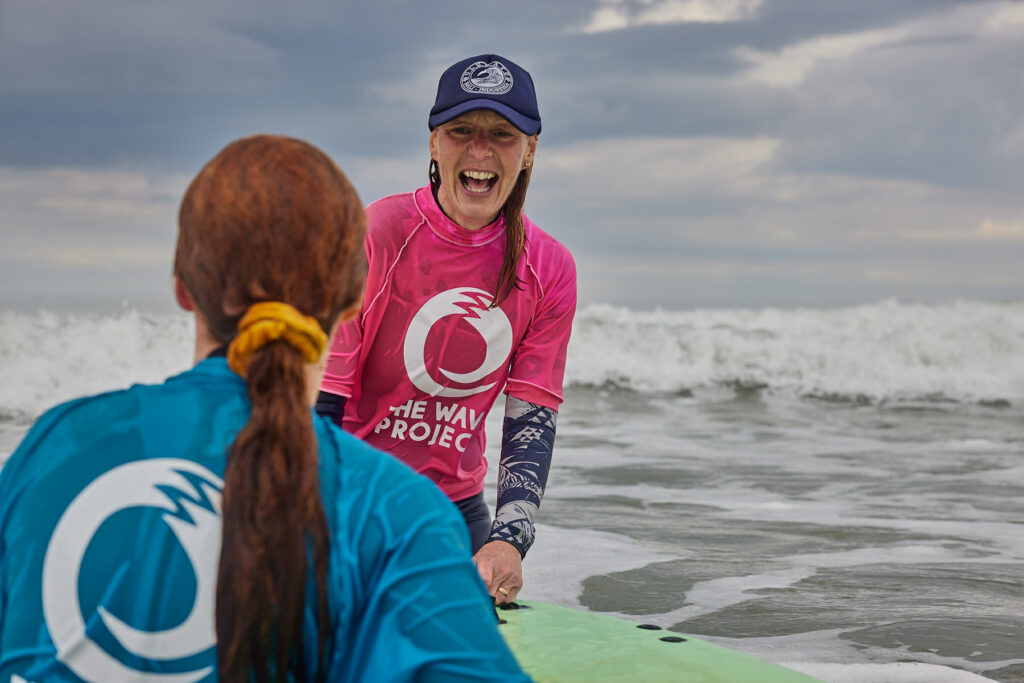
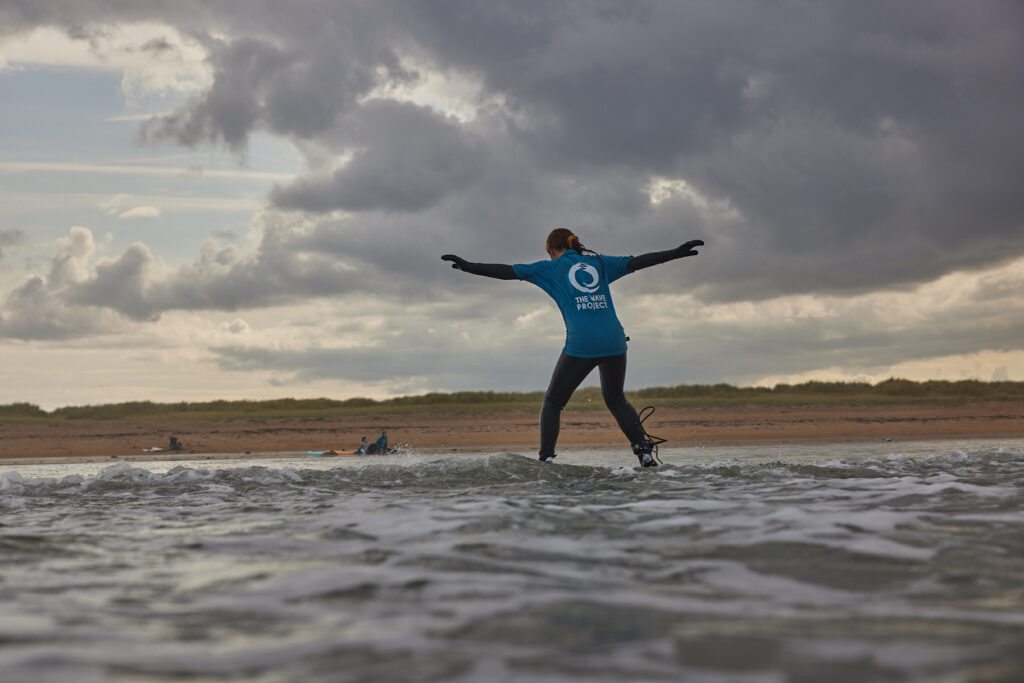
It’s about making connections, with the ocean, with the other young people and with the volunteers. It’s such a supportive space
Robyn was supported by the Wave Project when she was 15. Her story of the impact the Wave Project’s surf therapy had on her is the most moving interview we held for this project. Robyn said: “[Before the surf therapy] I wouldn’t go anywhere. I wouldn’t leave the house. Sometimes I couldn’t leave my bedroom. I was too scared to do anything. I’d been struggling for a while, since I was maybe eight. I was undiagnosed autistic and I had a lot of big feelings that I wasn’t able to deal with.”
By the end of the course, Robyn found she was able to begin opening up and feel confident in the group: “I was still really anxious until maybe the fifth week, but I started to ease into it. Then I remember crying home on the sixth week when the course had finished, because it was finally a place I could just be myself. I didn’t have to pretend to be anything else. I didn’t have to act a certain way and I didn’t have to hide. I could just be me.” Robyn now volunteers for the Wave Project, helping other people benefit from the charity’s surf therapy.
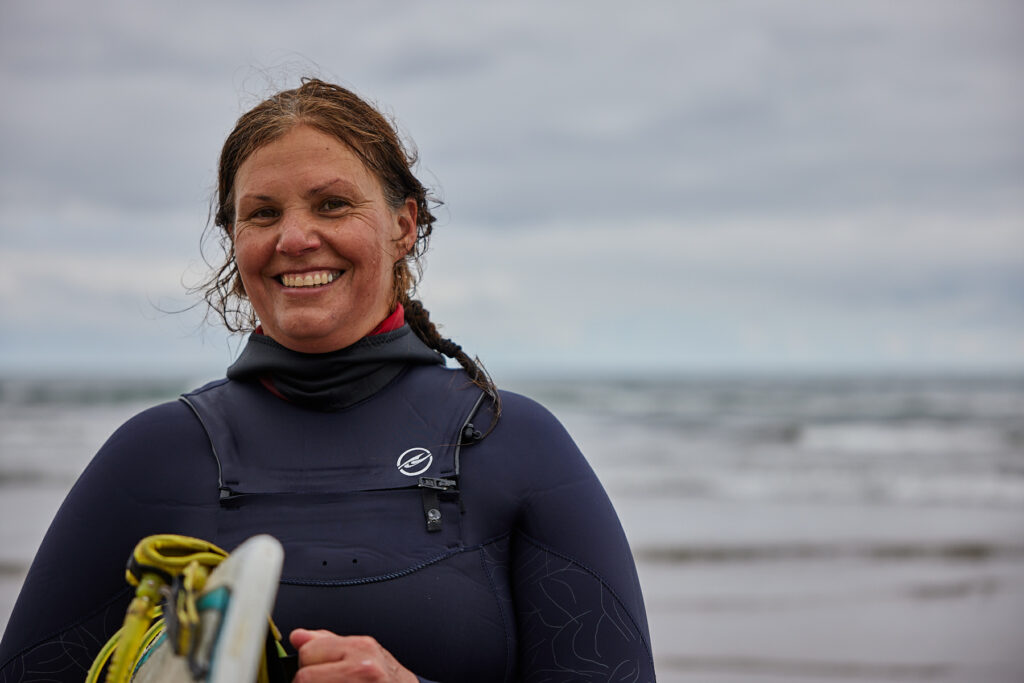
Framed by dramatic red sandstone cliffs at either side, Pease Bay has the reputation of being the best surfing beach on this coast. Here we spoke to Sally Harris from Groundswell Scotland, a charity providing surf therapy programmes to support women and non-binary people recovering from trauma. Participants can self-refer to Groundswell Scotland courses, but the majority come through partnerships with other organisations, including Edinburgh Rape Crisis, the NHS and the Ridge, a charity which supports vulnerable people in East Lothian.
When you work with people and see what the sea does for them […] it’s the most powerful, purposeful work I could ever want to be involved in
The journey of one participant referred by Edinburgh Rape Crisis demonstrates the healing experience Sally is seeking to provide: “She’d lost all her confidence and had to leave her job because of what she’d been through. The course has completely changed her life around – now she’s going out by herself again and she’s made some really positive decisions about what she wants to do next.”
“When you work with people and see what the sea does for them and that they’ve now got a place they can come to, that they’ve connected deeply with themselves, it’s the most powerful, purposeful work I could ever want to be involved in.” The participant is now going to join the Groundswell Scotland steering group to input into the charity’s work.
We knew the stories we’d hear would take us to some unexpected places. Somewhere we definitely didn’t expect to be taken was the middle aisle of Aldi, but that’s exactly where our interview with Martin McQueenie ended up; the detour serves as a great example of the breadth of Martin’s involvement in surfing in the southeast of Scotland.
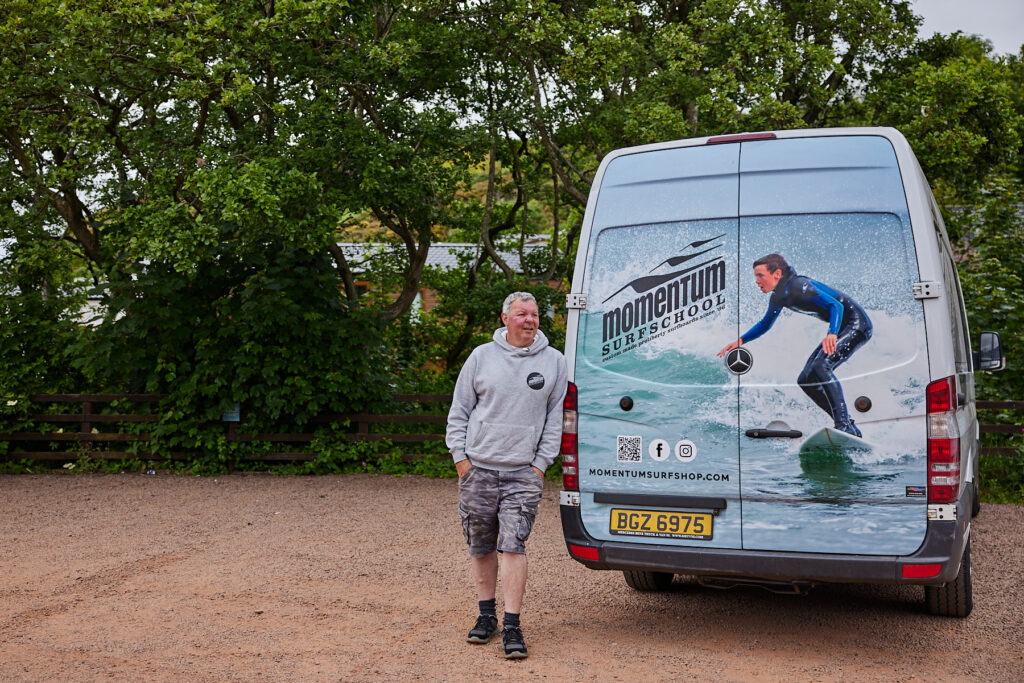
In 2018, Aldi made an advert celebrating the multiverse of nonsense you can buy in its middle aisle. Included in this ad was a wetsuit, which was featured in a scene of a middle-aged British Asian man from Lancashire learning to surf. The scene was shot at Pease Bay and Martin was the person employed to take care of water safety for the shoot.
Like many people before and after him, the actor had Martin to thank for his experience of surfing at Pease Bay
Unfortunately the ad was shot in April, when the water temperature at Pease Bay is around 7°C and Aldi’s wetsuit was only 2 millimetres thick. For those not familiar with wetsuits, a 2mil wetsuit is designed for water temperatures of 15+°C. So although the man in the final ad looks to be having a lovely time when he delivers the line “It’s a bargain!”, that’s largely because he’s wearing Martin’s winter wetsuit underneath the Aldi wetsuit. Like many people before and after him, the actor had Martin to thank for his experience of surfing at Pease Bay.
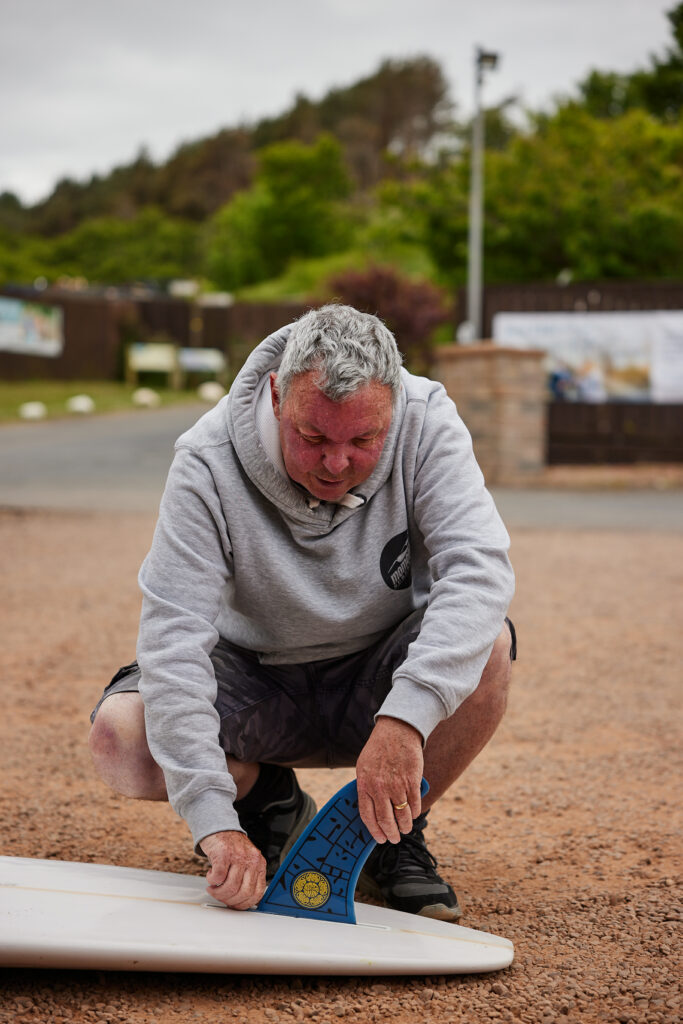
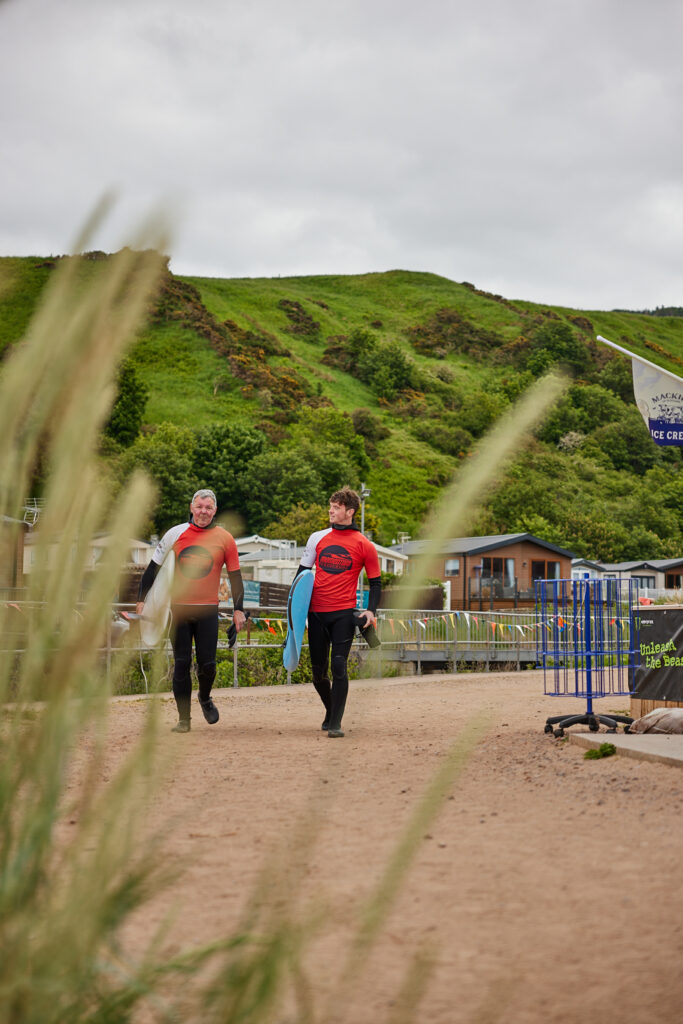
Beyond keeping actors warm by lending them his wetsuit, it’s hard to overstate Martin’s contribution to the southeast of Scotland surf scene. A non-exhaustive list includes running Momentum surf school, fixing and shaping boards, training coast guards and running RNLI water safety sessions in schools, coaching the Scottish junior surf team, helping organise the Scottish Surfing Championships and most recently supporting the development of Lost Shore, an artificial surf park being built in Ratho, Edinburgh.
All those hardcore surfers have now got kids, and mum, dad and children are all out surfing. It’s a lot more family oriented. It’s really amazing to see
The last stop on our walk was Coldingham Bay, where Steve Powner has run St Vedas Surf Shop since 2002. Steve said seeing young people he’s helped teach to surf now lifeguard the beach he works at is a small part of a much larger shift in the local surfing community over recent years: “When we started, there was really just a small group of hardcore surfers, who were all youngsters. Now there’s a lot more families getting into it – all those hardcore surfers have now got kids and mum, dad and children are all out surfing. It’s a lot more family oriented. It’s really amazing to see.”
“I was teaching a group lesson the other day and there was a kid out with his dad, maybe six or seven years old. His dad would push him into a wave, then he would pop up and weave his way through all the surfers I was teaching. They all just stood in awe. It’s lovely to see the kids out there mixing it with the adults.”
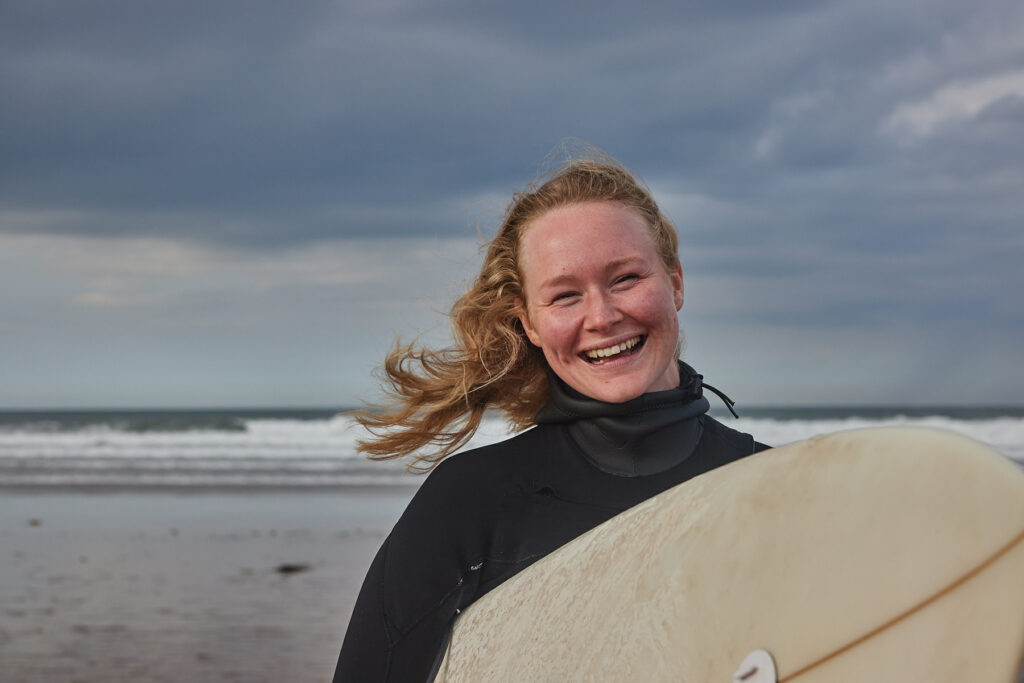
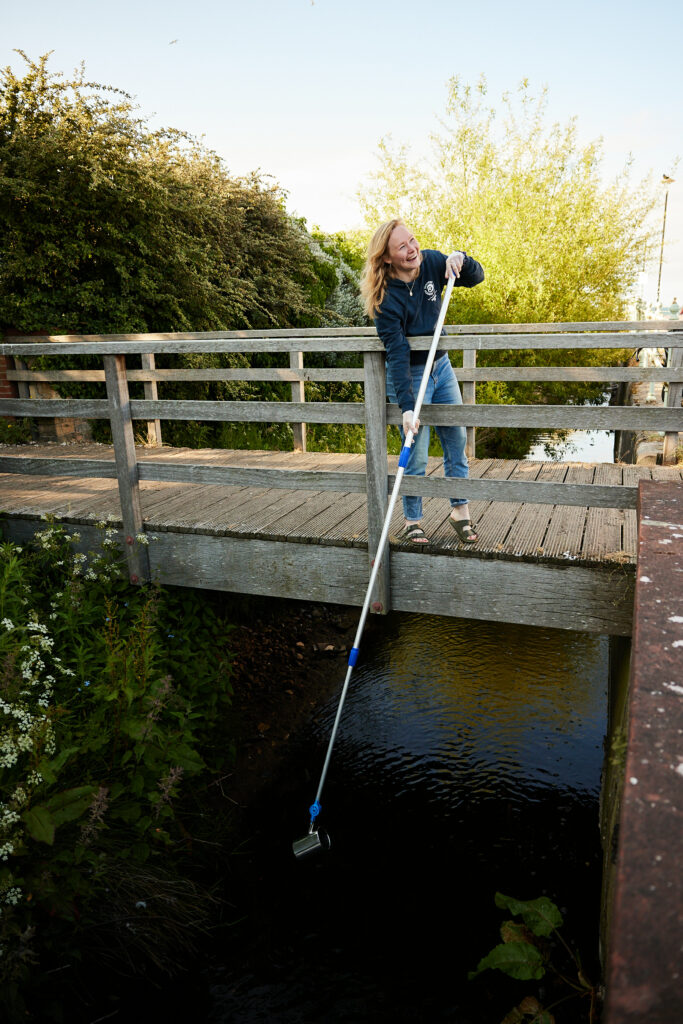
Environmental charity Surfers Against Sewage (SAS) are active along this coastline and SAS volunteer Elspeth Simpson, who also volunteers with Wave Project, articulated how immersing herself in the surf community has changed the focus of activity: “Through volunteering it’s gone beyond just surfing, it’s now about being part of this lovely community and going beyond the hedonistic self-pursuit of surfing and contributing to bigger causes – the social impact of Wave Project and the environmental impact of SAS. That’s why I keep doing it.”
Slow Waves is not a spot guide and you won’t find any stories of gnarly waves and epic sessions. This isn’t even really about surfing – it’s a collection of stories celebrating the ways the surfing community along this coast is making a positive impact far beyond the confines of the sport itself.
The complete Slow Waves zine is available to order here
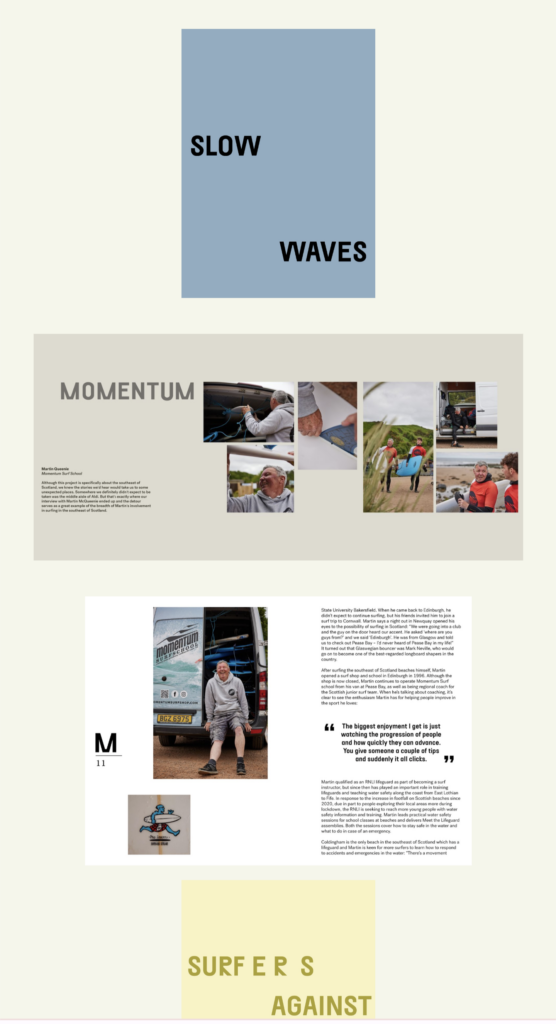
Mike Guest is a photographer from Edinburgh and self-confessed salt water addict. As well as working for major brands, Mike works with community initiatives, including recently facilitating a group of young creatives in Caithness exploring their relationship with the ocean.
Dave Lyons is a writer and charity communications professional who surfs regularly on beaches between Dunbar and Eyemouth. He has written about surfing in Scotland previously, most recently for Adventure Uncovered and Scottish Island Explorer.
Last year we launched “Tales from a Slow Way,” a community stories initiative that enabled us to commission creatives and community groups to work together to produce original stories and content situated around Slow Ways walking routes. Each award included a donation to the organisation as well as a project fee to the creative. Together, the awarded projects map the sheer diversity of walkers across the UK and highlight the importance of forging new paths.
Click here to find out more about our Tales from a Slow Ways project! Why not sign up to walk and review Slow Ways. You can also find and follow us on Instagram, Twitter and Facebook.